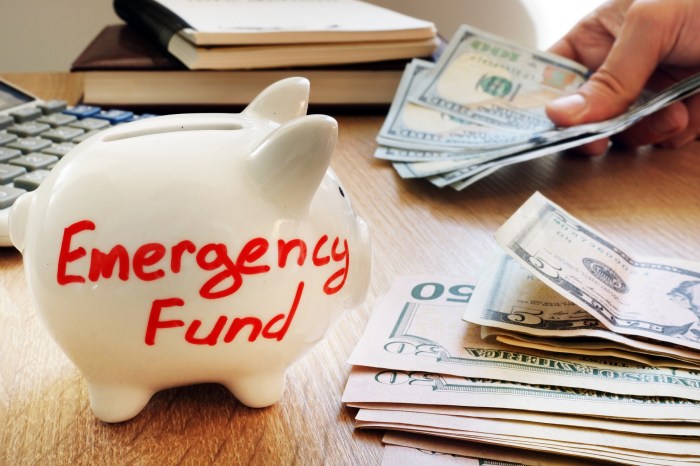Buckle up and get ready for a wild ride into the world of emergency preparedness savings! Think of it as your ultimate guide to financial survival in the face of unexpected chaos. From real-life examples to expert advice, this journey will equip you with the tools you need to navigate the murky waters of financial emergencies like a boss. So, are you ready to dive in and explore the ins and outs of emergency preparedness savings? Let’s roll!
In a world where financial uncertainty lurks around every corner, having a solid emergency fund can be the difference between smooth sailing and a financial shipwreck.
Importance of Emergency Preparedness Savings

In today’s unpredictable world, having emergency preparedness savings is more important than ever. These savings serve as a financial safety net during unexpected events, providing a sense of security and stability when facing unforeseen circumstances.
Crucial Financial Lifesaver
Having dedicated emergency savings can be a lifesaver in situations such as sudden job loss, unexpected medical expenses, or major home repairs. Without these savings, individuals may be forced to take on high-interest debt or deplete their regular savings meant for other goals.
- During a global pandemic, individuals with emergency savings were better equipped to handle job loss or reduced income, minimizing the financial strain on their daily lives.
- In the event of a natural disaster like a hurricane or earthquake, emergency savings can help cover evacuation costs, temporary housing, or repairs to damaged property.
- If faced with a medical emergency or sudden illness, having emergency savings can prevent individuals from going into debt to pay for necessary treatments or procedures.
Studies have shown that households with emergency savings are more financially resilient and experience less stress during times of crisis.
Setting Realistic Savings Goals
When it comes to emergency preparedness, setting realistic savings goals is crucial to ensure financial security during unexpected situations. Determining the appropriate amount to save for emergencies can be a challenge, but with the right strategies, individuals can establish achievable goals to meet their needs.
Determining the Appropriate Amount to Save
- Start by assessing your monthly expenses, including bills, groceries, and other essential costs.
- Consider factors such as the size of your family, health needs, and any potential emergencies that may arise.
- Calculate at least three to six months’ worth of expenses for a solid emergency fund.
Strategies for Setting Achievable Goals
- Set specific savings targets each month based on your income and expenses.
- Avoid setting goals that are too ambitious and may be difficult to achieve, as this can lead to frustration.
- Automate your savings by setting up automatic transfers to a separate emergency fund account.
Short-Term vs. Long-Term Savings Goals
- Short-term savings goals focus on immediate needs and emergencies that may arise in the near future.
- Long-term savings goals involve saving for larger emergencies, such as job loss or major medical expenses.
- Balancing short-term and long-term savings goals is essential for comprehensive emergency preparedness.
Building an Emergency Fund
Building an emergency fund is crucial for financial stability during unexpected situations. It provides a safety net to cover expenses in case of job loss, medical emergencies, or natural disasters.
Steps to Create and Grow an Emergency Fund
- Set a realistic savings goal: Start by saving a small amount each month and gradually increase it to reach your desired emergency fund target.
- Automate your savings: Set up automatic transfers from your checking account to a separate savings account dedicated to your emergency fund.
- Cut unnecessary expenses: Evaluate your spending habits and identify areas where you can cut back to redirect more money towards your emergency fund.
- Consider additional income sources: Look for ways to increase your income, such as taking on a side hustle or freelance work, to boost your emergency fund savings.
Where to Store Emergency Savings
It’s important to store your emergency savings in a separate account that is easily accessible in times of crisis. Consider keeping it in a high-yield savings account or a money market account for quick access without sacrificing potential growth.
Importance of Regularly Contributing to an Emergency Fund
Consistent contributions to your emergency fund ensure that it continues to grow over time and remains adequate to cover unexpected expenses. By making regular deposits, you can build a strong financial safety net for any unforeseen circumstances that may arise.
Managing and Utilizing Emergency Savings
Having emergency savings is essential, but knowing how to manage and utilize them effectively is equally important. By following best practices, you can ensure that your emergency funds are readily available when needed the most.
Best Practices for Managing Emergency Savings
- Keep your emergency savings in a separate account: To avoid the temptation of dipping into it for non-emergencies.
- Regularly review and update your savings goals: Ensure that you are setting aside an adequate amount for emergencies based on your current financial situation.
- Automate contributions: Set up automatic transfers to your emergency fund to ensure consistent savings.
- Only use emergency savings for true emergencies: Avoid using these funds for non-essential expenses.
Appropriate Use of Emergency Savings
- Medical emergencies: Unexpected medical expenses that are not covered by insurance.
- Car repairs: Essential repairs to ensure safe transportation.
- Job loss: To cover essential expenses while looking for a new job.
Psychological Impact of Having Emergency Savings
Having emergency savings can provide peace of mind and reduce stress during emergencies. Knowing that you have a financial cushion in place can help you make better decisions and navigate difficult situations with more confidence.
